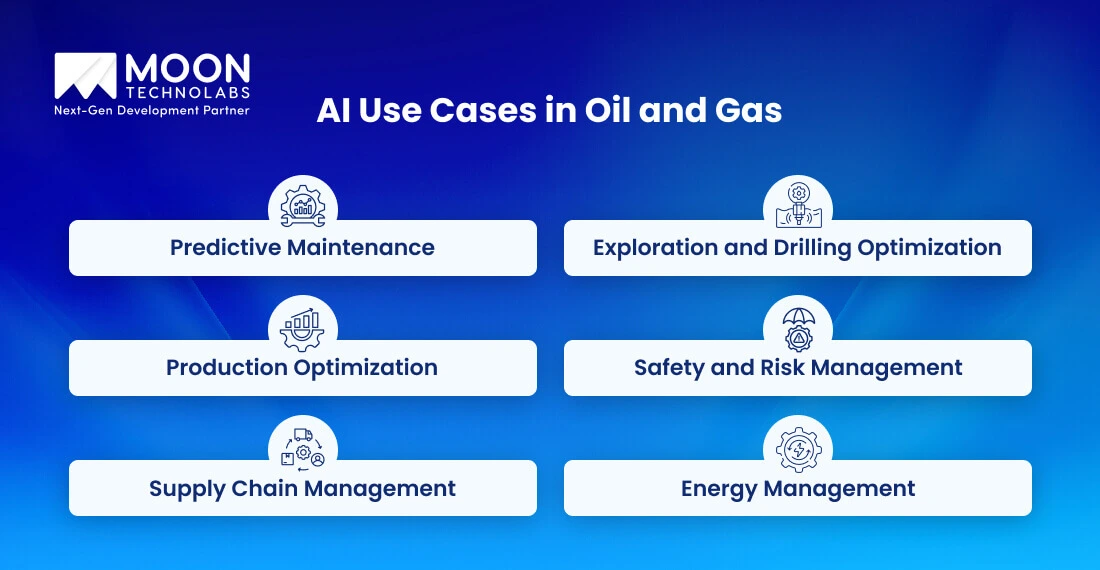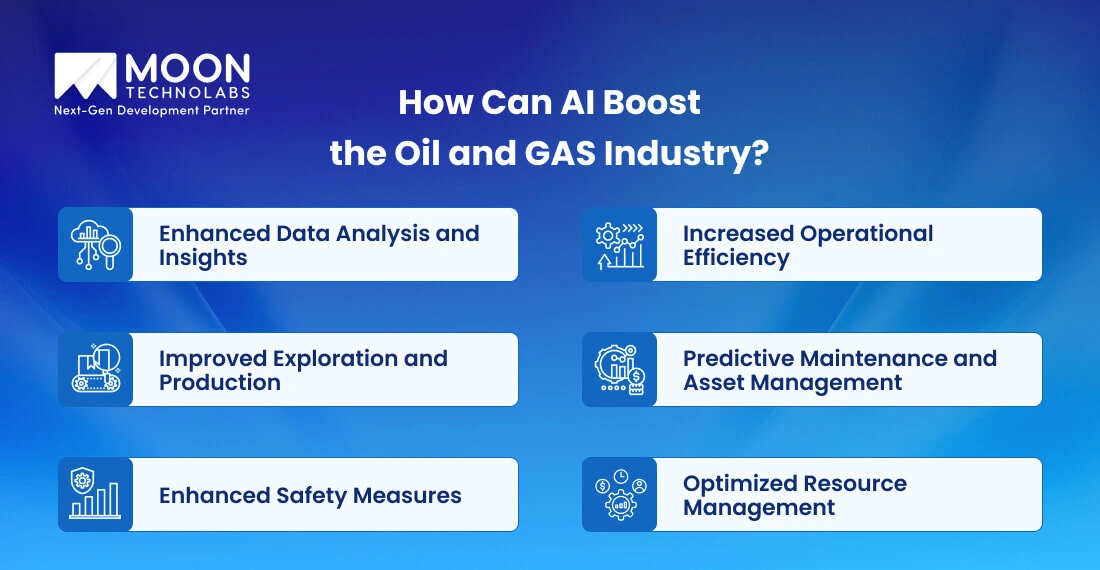Table of Content
Blog Summary:
This blog discusses how AI is improving energy management, predictive maintenance, and efficiency in the oil and gas industry. It covers significant AI use cases and future trends, showing how AI will transform the energy sector.
Table of Content
The oil and gas industry has advanced technologically. In recent years, AI has transformed this sector of energy exploration, production, and management rapidly.
Artificial intelligence transforms several fields and enhances operations. The AI revolution is also affecting the oil and gas industry. Its vast reach includes healthcare, finance, and transportation networks, reflecting a major shift.
According to the World Economic Forum, widespread AI in the oil and gas industry might lead to a 10–20% cost-saving paradigm shift by 2025. As AI advances, its profound impact on this industry will grow, suggesting a major transformation.
Artificial intelligence can also boost efficiency and performance in the oil and gas industry, just like in other sectors. Mordor Intelligence predicts that the Global AI in the Oil & Gas market will reach US$3,349.89 million by 2026, growing 10.14% from 2021 to 2026. This blog covers how AI is changing the oil and gas business and energy production.
The oil and gas industry is constantly evolving. In the beginning, the industry used mechanical tools and manual labor. The first technological advances centered on hardware, better drilling equipment, sensors, and exploration instruments. Limited usage of digital computers and software for data analysis began with geological interpretations and reservoir simulations.
The oil and gas sector first reacted cautiously to AI. Initial applications focused on data analysis for exploration and production. Using data, simple AI systems predicted equipment problems and improved drilling settings. Though limited, these applications showed AI’s potential to improve efficiency and accuracy.
AI now plays a major role in oil and gas operations across the value chain. Complex tasks require advanced machine learning and neural networks. AI enhances exploration data analysis and assists in locating drilling locations. Artificial Intelligence optimizes productivity and sustainability in well drilling processes.
AI is also changing business paradigms in the oil & gas industry. Companies can use predictive analytics to analyze market trends and see ai integration in oil and gas price predictions. Incorporating AI into the operations to promote environmental sustainability, operational effectiveness, and data-driven decision-making.

Explore how AI is revolutionizing the oil and gas sector with its use cases in energy management, predictive maintenance, drilling, and more.
AI-powered predictive maintenance solutions monitor equipment via sensors and data analytics. These systems can detect and predict problems, enabling prompt repair.
This proactive approach to schedule maintenance lowers unplanned downtime and maintenance costs for oil & gas companies, and extends crucial machinery’s lifespan, saving money. AI in software development for the oil and gas industry avoids catastrophic equipment failures that could result in mishaps.
Simple analytics monitors equipment to prevent potential asset failures, process analytics optimizes production stages, and system analytics provides a holistic view of facilities for operational efficiency. Together, these insights improve equipment reliability, process optimization, and system performance.
The use of AI in oil and gas exploration is changing how businesses find and assess drilling locations. AI can more precisely and economically identify high-potential places by evaluating large datasets, such as seismic surveys and geological records.
This lowers the hazards connected to conventional exploration techniques and enables better-informed decision-making.
The more accurate forecasts produced by AI’s real-time data processing capabilities further reduce the dangers associated with drilling operations. As AI develops, it is becoming increasingly important in exploration and drilling.
AI solutions increase the efficiency of drilling optimization through automation and real-time data. AI technologies keep an eye on drilling conditions and equipment performance, instantly adjusting to optimize the process. This lowers the frequency of equipment breakdowns and delays while also improving operational precision.
AI’s ability to offer a continuous feedback loop guarantees that drilling operations are constantly in line with peak performance. As more AI-driven technologies are adopted, maintaining a competitive edge in the oil and gas industry will depend on drilling process optimization.
Through automation and predictive analytics, AI is completely changing production optimization in the oil and gas sector. AI-driven predictive maintenance reduces downtime and increases productivity by assisting businesses in anticipating equipment breakdowns before they happen.
This proactive strategy guarantees efficient production processes and increases the lifespan of infrastructure. AI is an important part in contemporary oil and gas production since it allows businesses to lower operating & maintenance costs and improve overall output by utilizing its analytical capabilities.
AI applications enhance manufacturing processes beyond maintenance by evaluating real-time data to modify flow rates, pressure levels, and other crucial parameters. This guarantees the effective extraction of resources, increasing productivity while improving energy efficiency and decreasing waste.
The capacity to enhance production processes will be crucial to promoting market sustainability and profitability as the oil and gas sector continues to embrace AI.
Compliance with regulations is vital for the oil and gas industry. When rules and standards change frequently, companies face major challenges. To keep up with current laws and regulations, companies must process vast amounts of data.
However, manually processing all the data is nearly impossible. Data analysis is a significant challenge that can be automated with AI in the oil and gas industry.
Safety will require ML algorithms for risk assessment and control. These technologies can evaluate historical events & operational data to find patterns and analyze real-time situations. AI-powered solutions can notify management of potential hazards and any deviations from the usual to help them handle all circumstances.
Artificial intelligence is transforming supply chain management in the oil and gas industry with its advanced forecasting, inventory management, and logistics planning capabilities. Businesses can use predictive analytics to foresee changes in demand and modify their supply chain procedures accordingly.
This not only enhances efficiency but also significantly reduces operational costs and improves customer satisfaction by ensuring timely delivery and availability of resources. By leveraging AI to optimize every aspect of the supply chain, companies can achieve a leaner, more responsive operation that adapts to market demands in real time.
Moreover, AI’s ability to predict potential risks and disruptions in the supply chain allows organizations to develop contingency plans, ensuring continuous operations even in the face of unforeseen challenges. This enhanced visibility and agility make supply chains more robust and capable of withstanding various pressures while maintaining high performance.
As AI continues to evolve, its role in fortifying and streamlining supply chains in the oil and gas sector will only grow, providing a critical edge in a competitive and often volatile industry.
AI plays a pivotal role in optimizing energy management by analyzing vast amounts of data generated from various operations. Through sophisticated algorithms and machine learning models, AI monitors and controls energy usage across the entire value chain, identifying inefficiencies and predicting future demand with remarkable accuracy.
This capability enables companies to optimize their energy consumption, leading to cost reduction, lowering operational costs, and minimizing waste. By integrating AI into energy management strategies, businesses can enhance their sustainability efforts, reducing their environmental footprint while maintaining high levels of efficiency.
AI also empowers oil and gas companies to make data-driven decisions that improve the overall sustainability of their operations. By predicting energy needs and optimizing usage, AI helps reduce unnecessary energy consumption, which directly impacts the company’s carbon footprint and environmental impact.
As sustainability becomes increasingly important in the global energy market, the ability to leverage AI for smarter, more efficient energy management will be a key differentiator for leading companies in the industry.

Learn how AI improves quality control, operational efficiency, exploration, data science, and resource management to develop oil and gas industry leaders.
The oil and gas industry uses AI to handle vast amounts of data, identify trends, condense and visualize data, and enable data scientists to produce precise forecasts. These functions are vital to strategic planning and decision-making. Oil and gas companies use AI to enhance data processes and acquire real-time insights.
Automation and workflow optimization using AI optimize oil and gas operations. Advanced analytics algorithms can evaluate massive amounts of data in real-time, improving decision-making and operations. This reduces manual intervention, speeds response times, and boosts production, making firms more efficient and cost-effective.
AI predicts drilling sites from geological data to enhance exploration and productivity. Machine learning techniques increase exploration accuracy by identifying seismic data trends and anomalies. AI can improve well output and extraction by optimizing production.
AI analyzes data from equipment and predicts issues for predictive maintenance. Artificial intelligence (AI) systems can see assets, anticipate possible failures, and forecast maintenance requirements using historical data and real-time sensors, reducing key asset breakdowns and downtime. This proactive asset management strategy extends crucial equipment life and improves operations.
By using predictive maintenance systems, AI has improved security in the oil and gas field. AI-driven systems predict industrial problems, enabling proactive repairs that decrease accidents and maintain safety.
Artificial intelligence linked with surveillance systems enhances personnel monitoring and transportation in oil and gas facilities. AI-powered pollution monitoring, leak detection, and regulatory compliance systems analyze data to identify non-compliance tendencies.
AI and machine learning enable safe autonomous car and robot operations on hazardous sites. Although safety monitoring and data integrity monitoring have minimized accidents through predictive maintenance. For continued success, AI must be integrated into and maintained in organizational safety processes.
AI analyzes supply chain data and optimizes resource allocation across activities. It aids demand forecasting, inventory management, and waste reduction. Companies can save money and use less energy by using AI-driven insights to match resources to production demands.
AI streamlines operations and provides data-driven projections. Given the previous outcomes, AI technologies should continue to alter the oil and gas industry with trends like autonomous operations, human-machine collaboration, remote operations, and drilling automation and will improve industry sustainability.
In the coming years, more AI-driven solutions will assist the industry in achieving sustainability and adhering to today’s environmental regulations and future generations’ needs. This requires greening all activities and processes, which AI can help with.
AI can monitor emissions and notify of any changes. Predictive equipment maintenance can also avert major equipment breakdowns that raise emissions.
They have enhanced energy storage facilities and efficiency. By optimizing production and distribution, businesses can save energy and lessen their carbon footprint. AI-driven data analysis and thorough reporting help organizations’ carbon footprint and develop environmentally friendly processes and technology.
Moon Technolabs develops oil and gas solutions using AI technology that improves efficiency and innovation. Moon Technolabs helps in oil and gas exploration, predictive maintenance, and operations with AI. In the volatile oil and gas business, our solutions set new norms for performance and growth.
Our advanced generative AI in oil and gas helps businesses alter the sector. With cutting-edge technology, we can optimize operations and supply chain management with customized solutions. Our artificial intelligence development services help oil and gas firms stay competitive with predictive maintenance and demand forecasting.
Moon Technolabs is your strategic partner for embracing AI and expanding your oil and gas business. Our experience goes beyond creating smart analytics solutions for smart decision-making in oil and gas solutions for company productivity. Grow your AI business with us.
Discover how AI can drive innovation, enhance efficiency, and transform your operations in the oil and gas industry. Let’s explore new possibilities together.
Finally, AI’s usage in the oil and gas industry marks a major change toward efficiency, safety, and sustainability. Data management, financial investment, legal compliance, and workforce flexibility must be addressed to realize AI’s potential.
AI will enable new business models, operational efficiency, and the adoption of renewable energy. Thus, oil and gas companies will become more data-driven, inventive, and sustainable.
01
02
03
04
Submitting the form below will ensure a prompt response from us.